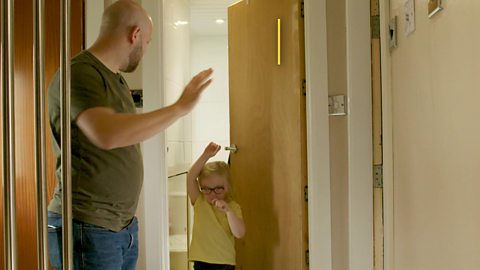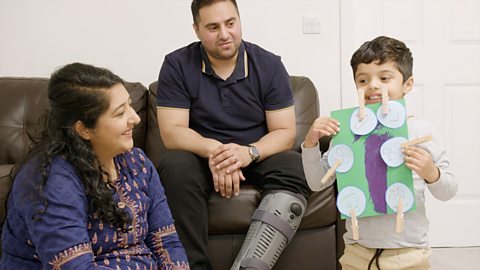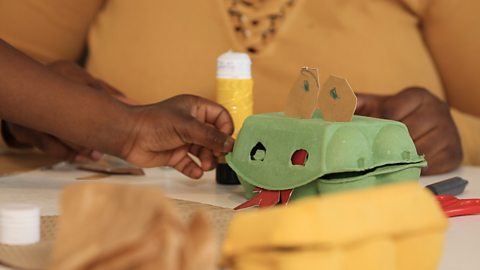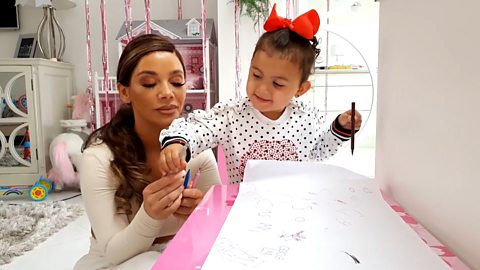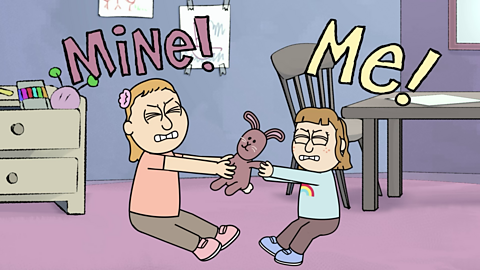Home > Activities > 4-5 years
From about 2 ½ years old, children can usually take turns or share.
But it’s often not until the ages of 3 to 5 they learn not to get frustrated when sharing with others, or if someone else takes something of theirs for a moment.
Encouraging your child to share objects with their toys through pretend play is a great way to help them practise this important skill.
Watch the video below to find out how you can empower your child to share nicely by giving them the right words to use and examples of when to use them.
Two dark blues for him…
Well done, that's good.
And two reds for her.
Well done.That one's for him
Yeah.
Good boy. We're going to do some sharing. Can I borrow the grey please?
The grey?
Yeah.
There you go.
Thank you.
That was very good asking. You asked very, very nicely then, didn't you?
I'm going to have blue and this one's going to have yellow.
Yellow one.
This one's going to have green.
Green one.
I'm making a sun.
A sun? That is massive.
I think I'm going to draw a flower now.
Oh, you haven't got grass!
I haven't got grass?
I haven't got green!
Oh no…
Would you share?
There's green.
Thank you.
Sharing is…Caring!
Yeah! Good lad.
I'm drawing a rainbow.
Oh, that's lovely. Who's your picture for?
Elephant!
Aw, that's nice. Are you going to give a cuddle?
I've got one, two, three, four.
That's right. I've got four and dad's got three, so dad needs another one.
What colour's that?
Grey.
Grey.
So is it fair now?
Yeah.
And why is it fair?
Because you're sharing.
And why is it good to share?
Because then you'll be happy.
Yeah, and then it means everyone's playing together.
Yeah.
Good. Who is the best sharer?
Me!
You?
Yeah!
Good work. Good job.
What are the benefits of practising sharing with toys?
- Pretend play helps children explore social situations and test out their responses.
- Sharing builds on early turn taking skills and relies on your child interacting with others - a key part of communication development.
- Sharing with toys helps your child learn important social phrases that they can use when they start school.
- This activity gives children the confidence to use these phrases correctly.
- Problem-solving with teddies helps them work out problems and talk through issues.
- Talking about sharing helps children begin to understand fairness.
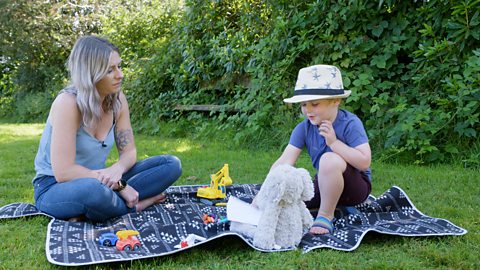
How to get the most out of sharing with toys
From crayons to food, you can practise sharing anything in this activity.
Get a circle of teddies and toys together and see if your child can share their items equally between them. If they want to have a different item, they must first ask the toy nicely to see if they'd like to swap.
While you're playing this game, it's important to talk about kindness. Make clear statements about why sharing is good for your child and others.
You could say something like, "When you share your toys with your friend, everyone gets to have fun".
This game is also a great opportunity to introduce the idea of fairness. Fairness is quite an abstract concept and can be difficult to explain to a child. Seeing it in action will help them get their head around it.
As a family, try to set good examples outside of playtime too. Continue the process of saying please and thank you and asking nicely in your everyday routine.
The more you show them what sharing looks like, the more they will learn to be generous themselves.

More activities to encourage sharing and turn-taking
- Simple ball games are a great way to teach children about taking turns.
- Holding a teddy bear's picnic is a great way to boost your child's imagination and encourage them to share with teddies and siblings.
- 'I spy' is a fantastic game to play with all of the family and teaches your child to be patient and wait for their turn.

